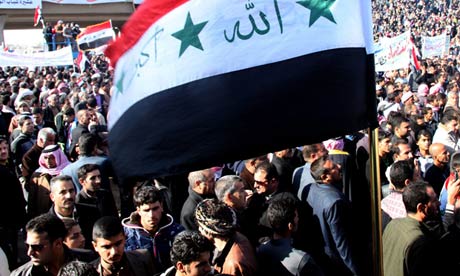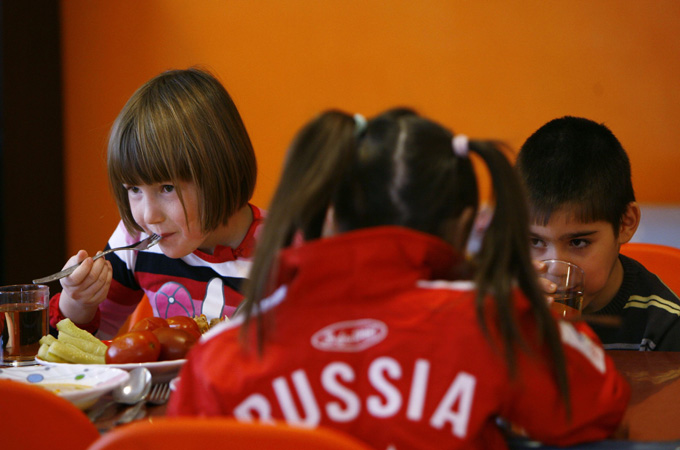Among Other Things!
Syrian Revolution Digest – December 30, 2012
Everywhere a battle and a massacre, everywhere misery, everywhere hope rebellious, everywhere a birth. Syria may no longer be a country, but it is surely a laboratory for experimenting with human folly and tenacity, among other things.
Today’s Death Toll: 143 (including 10 children and 7 women)
85 in Damascus and Suburbs, 24 in Aleppo (most in Maysar neighborhood), 14 in Hama (7 in Kafranboudeh), 9 in Daraa, 4 in Homs, 3 in Idlib, 2 in Raqqa and 1 in Deir Ezzor.
Points of Random Shelling: 337
26 by warplanes, 7 by Cluster Bombs, 3 by Phosphorus Bombs, and 7 by barrel bombs. Artillery shelling was reported in 125 points, mortar shelling in 114 points and missile shelling in 62 points.
Clashes: 122
Rebels downed 3 jets in Manbej (Aleppo), Eastern Ghoutah (Damascus) and Hama Suburbs. In Raqqah City, they gained control of a gas station in Hamra area after a 3-day siege, meanwhile, 21 members of regime forces defected in the Karama neighborhood. In Qalamoun region, Damascus, rebels liberated the headquarters of the 413th Battalion after fierce clashes with regime loyalists. They also completed their liberation of Regiment 14 and the fuels storage facilities in the city of Nabek, and liberated the suburb of Bahdaliyah. In the town of Zabadani, Damascus, rebels also managed to take control of a number of checkpoints destroying 5 military vehicles in the process. In Daraa, rebels gained control of Al-Gharbi checkpoint in Basr Al-Harir after fierce clashes (LCCs).
News
Envoy: 2013 could bring 100,000 deaths in Syria
Russia Sends Another Naval Ship to Syria
Israeli crosses border into Syria Kfar Qassem resident said to be mentally unstable crosses border in Golan Heights with apparent aim of urging Assad to stop killing his people
Special Reports
In Syria, What’s Left Behind?
War is in many ways about things that are left behind—people, items, ideas, innocence. It ages children before their time, turns neighbors into enemies (or family), it destroys communities and leaves scars that may or may not show. The confidently authoritarian Syria that existed before March 15, 2011 has eroded, its brutal decades-old secular pan-Arab regime is fighting for its existence. It will likely eventually go the way of other brutal decades-old secular pan-Arab regimes, like Hosni Mubarak’s Egypt, Zine El Abidine Ben Ali’s Tunisia and Muammar Qaddafi’s Libya, to be replaced by a more religiously conservative, Sunni Muslim power structure of some sort.
Syria Civil War: Gravediggers Have No Time To Wait For The Dead
Gravediggers at the cemetery in the northern Syrian town of Azaz no longer wait for bombs to fall before they break the ground. The dead come too fast… “We know the plane is coming to hit us, so we’re being prepared,” said Abu Sulaiman, one of a few men digging at the Sheikh Saad cemetary. “Massacres are happening. We’re putting every two or three bodies together. We’ve been working and digging since 6 in the morning. We’re going to dig 10 new graves today,” he said.
Video Highlights
Another video showing the massacre of Deir Baalbah, Homs City http://youtu.be/hYHe0rH6tRA
Leaked video shows how pro-Assad militias abuse the bodies of dead defectors http://youtu.be/5BHctiJ5kyk
In Damascus, rebels in Qalamoun take control of the town of Rankous http://youtu.be/lc9Vvuvlef0 But in Eastern Ghouta, the regime kept pounding the restive towns: Deir Al-Assafeer http://youtu.be/WwinTd2-oxU , http://youtu.be/PUd7-k5mf5E Aqrabah http://youtu.be/yYPzpPFZIcY In Jisreen people rush to save relatives and friends from under the rubble http://youtu.be/YZcl9oLUSQw , http://youtu.be/5sl15MX6PdE People do the same in Kafar Batna http://youtu.be/MXhU3qeYJfw
Along the border with Lebanon, the town of Zabadani continues to be pounded http://youtu.be/c43SMQObEDE
The pounding of the town of Rastan, Homs, continues http://youtu.be/ZF4lVelBKuY , http://youtu.be/AZx7eJ3oUiA
In Kafrenboudeh, Hama, people rush to pullout the injured and the dead from under the rubble in the aftermath of an aerial raid on the town http://youtu.be/v7X1h72J7J8 , http://youtu.be/l_YQWW9Sg6M The dead http://youtu.be/JiSs6MRPhYE Including children http://youtu.be/UHgsmRWOs40 , http://youtu.be/MM8wNYtF14s


